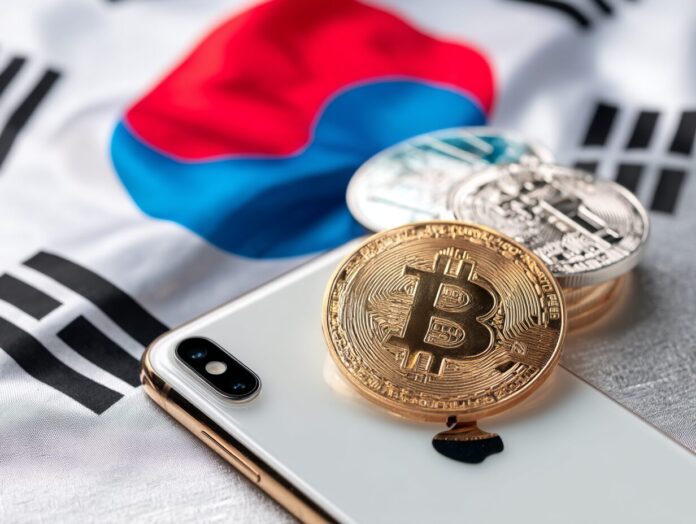In a move that has shaken the global crypto community, South Korea has taken firm regulatory action by blocking 14 cryptocurrency exchange apps from Apple’s App Store. The Financial Services Commission (FSC) led this effort to tighten oversight of the digital asset market. It also reflects concerns about unregulated platforms exposing users to fraud and instability.
According to a report by Forkast, these apps failed to register with authorities as required under South Korea’s financial transaction laws. These laws enforce anti-money laundering (AML), Know Your Customer (KYC), and real-name transaction standards. By restricting these apps, the FSC aims to push users toward more compliant platforms.
Crackdown on Unregistered Exchanges
South Korea is one of the busiest crypto markets, with strong retail participation and high daily trading volumes. But this has also made the country a target for unlicensed exchanges. Many of these foreign platforms operate beyond the reach of regulators.
The crackdown builds on a 2021 policy requiring all exchanges to register with the Financial Intelligence Unit (FIU) and partner with local banks. These measures ensure identity verification and transaction transparency.

The 14 exchanges in question lacked required registration. They also didn’t partner with local banks for identity checks or follow AML and KYC rules.
“Unregistered platforms operating within the domestic market pose a serious threat to consumer protection and financial order,” said an FSC spokesperson to Yonhap News.
This step aims to remove unsafe platforms and improve market integrity.
Impact on Retail Traders and the Market
The immediate impact of the ban is being felt by South Korea’s vast network of retail traders who use mobile apps for 24/7 trading, portfolio management, and market updates. With these 14 apps no longer accessible through the Apple Store, users are being nudged toward locally compliant exchanges like Upbit, Bithumb, and Coinone.
Although regulators tout the move as necessary for user protection, critics warn it could curb innovation and limit consumer choice. Smaller or international platforms may struggle to meet South Korea’s stringent regulatory requirements, potentially reducing the diversity and competitiveness of the market.
Still, the message from authorities is unequivocal: to operate in South Korea’s crypto ecosystem, exchanges must comply with local laws or face removal.
Apple’s Role and Broader Implications
Apple’s cooperation with South Korea’s FSC in delisting non-compliant crypto apps illustrates the evolving role of tech companies in regulatory enforcement. While Apple has always maintained strict App Store guidelines for security and privacy, this development reflects growing pressure for digital platforms to enforce financial compliance as well.
This precedent may inspire other countries to use app marketplaces as tools for financial oversight. As regulators in the EU, U.S., and Southeast Asia consider similar frameworks, South Korea’s approach could influence how global tech firms interact with financial legislation in the digital age.
Expansion of Oversight to Emerging Sectors
Since implementing the FIU registration regime, South Korea has broadened its regulatory reach to address a rapidly evolving financial landscape. Earlier efforts targeted unauthorized overseas trading platforms and peer-to-peer lending apps. More recently, in March 2025, the FSC and Ministry of Justice launched a joint task force to assess new areas like decentralized finance (DeFi), non-fungible token (NFT) marketplaces, and financial services in the metaverse.
The government has also turned its focus to crypto marketing and influencer content on social media, aiming to crack down on misleading promotions and pump-and-dump schemes. Collectively, these actions represent a concerted effort to foster a safer, more mature environment for digital asset activity in South Korea.
Industry Reactions and the Road Ahead
Reactions within the crypto industry have been divided. Supporters of stricter regulation argue that government intervention is essential for protecting users and maintaining market integrity. On the other hand, critics caution that overregulation could stifle innovation and drive activity to less transparent offshore platforms.
Nevertheless, South Korea’s reputation as a pioneer in crypto regulation gives its policies global significance. Companies looking to enter the Korean market must now weigh the benefits of access against the costs of compliance.

For users, the regulatory changes bring both limitations and benefits. While the number of available apps may shrink, the remaining options are likely to offer greater security, transparency, and regulatory oversight.
Conclusion
South Korea’s move to block 14 unregistered crypto exchange apps from the Apple Store marks a significant milestone in the country’s journey toward comprehensive digital asset regulation. The collaboration between government agencies and global tech platforms underscores a shift in how financial compliance will be enforced in the digital era.
Although some may view these developments as restrictive, they reflect a growing international consensus that user protection and market integrity must come first. For exchanges, developers, and investors, the writing is on the wall: compliance is no longer optional—it is essential for long-term viability.
As other countries look to South Korea’s example, the future of crypto may be shaped not just by innovation, but by the ability of companies to align with evolving regulatory expectations.
Further Reading:
- Coin Telegraph: South Korea blocks 14 crypto exchanges on Apple Store
- FCS: FSC cracks down on unlicensed exchanges
- Korea Financial Services Commission (FSC) Press Releases
- Reuters: South Korea’s tightening crypto oversight



